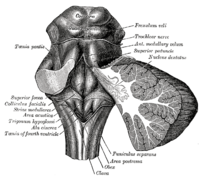
Photo from wikipedia
Rett syndrome (RTT) is a neurodevelopmental disorder caused by mutations in the MECP2 gene. In the absence of MeCP2, expression of FXYD domain-containing transport regulator 1 (FXYD1) is deregulated in… Click to show full abstract
Rett syndrome (RTT) is a neurodevelopmental disorder caused by mutations in the MECP2 gene. In the absence of MeCP2, expression of FXYD domain-containing transport regulator 1 (FXYD1) is deregulated in the frontal cortex (FC) of mice and humans. Because Fxyd1 is a membrane protein that controls cell excitability by modulating Na+, K+-ATPase activity (NKA), an excess of Fxyd1 may reduce NKA activity and contribute to the neuronal phenotype of Mecp2 deficient (KO) mice. To determine if Fxyd1 can rescue these RTT deficits, we studied the male progeny of Fxyd1 null males bred to heterozygous Mecp2 female mice. Maximal NKA enzymatic activity was not altered by the loss of MeCP2, but it increased in mice lacking one Fxyd1 allele, suggesting that NKA activity is under Fxyd1 inhibitory control. Deletion of one Fxyd1 allele also prevented the increased extracellular potassium (K+) accumulation observed in cerebro-cortical neurons from Mecp2 KO animals in response to the NKA inhibitor ouabain, and rescued the loss of dendritic arborization observed in FC neurons of Mecp2 KO mice. These effects were gene-dose dependent, because the absence of Fxyd1 failed to rescue the MeCP2-dependent deficits, and mimicked the effect of MeCP2 deficiency in wild-type animals. These results indicate that excess of Fxyd1 in the absence of MeCP2 results in deregulation of endogenous K+ conductances functionally associated with NKA and leads to stunted neuronal growth.
Journal Title: Brain Research
Year Published: 2018
Link to full text (if available)
Share on Social Media: Sign Up to like & get
recommendations!